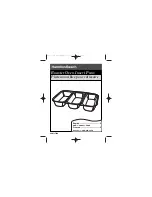
COMPONENTS AND ASSEMBLY
The lid and handle knob are packaged as separate pieces and need to be assembled
prior to use. You will need a Philips Head Screwdriver.
1.
Remove the components from the plastic bag. Check to ensure all of the following
parts are included:
1. Handle knob
2. Flange
3. Rubber Spacer
4. Washer
5. Screw
6. Lid
2.
Line up the components in order as shown in figure 1 and tighten the screw until
the handle is firm.
NOTE: Do not over tighten the screw as you may crack the glass.
FIRST TIME USE
Make sure the temperature control probe is not connected to the Wok.
Clean the outside and bottom of the pan with a soft damp cloth.
Wash the lid in warm soapy water, rinse with clean water and dry.
You will need to “season” your Wok before using. Refer to the second point in
CARING FOR YOUR Wok below.
After conditioning, your new Wok is ready for use.
CARING FOR YOUR WOK
It is important to look after the non-stick coating on your Wok to ensure trouble
free operation. Using a non-stick surface allows you to cook without fats or oils.
Wash, rinse and dry both the pan and lid and “season” the cooking surface by
applying a thin coat of oil to the base and sides and gently rubbing it in with a paper
towel. Turn the control on full and allow to run for 2-3 minutes. If you are not
planning on cooking anything, turn off the control and unplug the unit.
“Seasoning” should be performed approximately every four to six weeks.
Do not let the Wok get too hot without either oil or food on the cooking surface as
high temperatures can cause discoloration of the surface and will reduce the life of
the non-stick surface.
Normally, a medium heat setting on your Wok will give adequate heat for most of
your cooking needs.
If high temperatures are required for your cooking needs, it is best to introduce the
heat slowly by preheating the pan on a medium setting for a few minutes before
turning the heat up further.
























